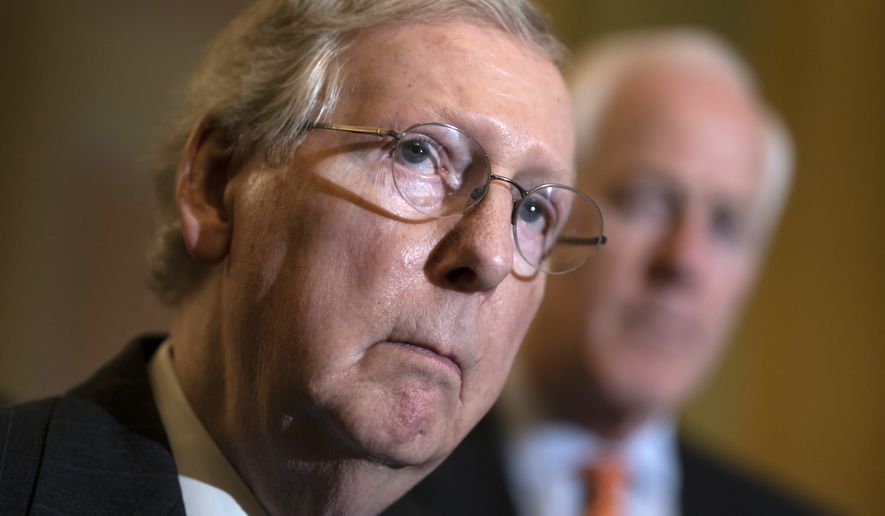Looking to speed the confirmation process for a backlog of President Trump’s appointments, Senate Republicans on Wednesday advanced a measure to cut down on floor debate for certain executive branch and judicial nominees.
Republicans said Democrats forced their hand on the issue by making the Senate devote too much floor time over the past year to clearing procedural hurdles on even non-controversial and lower-level nominees.
“Pointless wasting time, even when we know what the outcome is going to be, is what we’re talking about here today,” said Senate Majority Leader Mitch McConnell.
The change, pushed by Sen. James Lankford, Oklahoma Republican, passed the Senate rules committee in a party-line vote, 10-9.
The change would cut the maximum debate time for non-Cabinet executive branch nominees from 30 hours to eight, and for district court nominees from 30 hours to two.
Thanks to Democrats’ use of the “nuclear option” on rules changes in 2013, they can’t unilaterally stop most of Mr. Trump’s nominations, which can advance on simple majority votes. Republicans currently hold a 51-49 majority in the Senate.
But under the current rules of the Senate, Democrats can set up procedural roadblocks and force nominations to eat up 30 hours or more of floor time, often stretching their consideration over several days.
Mr. Trump said that at the current rate, it would take nine years for all his nominees to get confirmed.
“We have hundreds of people in-waiting to be approved, and the Democrats are taking 30 hours per person,” the president said this week. “They’re taking the maximum time. They are obstructions. That’s very bad for our country.”
As of April 15, senators had approved 421 civilian nominees since Mr. Trump took office — roughly 150 nominees behind President Barack Obama at the same point and 250 behind President George W. Bush.
Mr. Lankford’s office said that as of Wednesday, more than 200 executive, district court and circuit court nominations were pending.
The Oklahoma senator says his proposal mirrors a temporary rule the Senate passed in 2013 that was pushed by then-Majority Leader Harry Reid and supported by other key Democrats like current Senate Minority Leader Charles E. Schumer.
“The current historic Senate Democrat obstruction of nominees is not just impacting this president. It’s hurting the American people by slowing operations and services at multiple federal agencies,” Mr. Lankford said.
Conservative activist groups cheered Wednesday’s vote, saying the move is necessary to end Democrats’ “weaponization” of Senate procedure.
“Americans are sick and tired of Senate Democrats abusing the rules of the Senate to create gridlock and unnecessarily stall President Trump’s well qualified judicial and executive branch nominees,” said Jenny Beth Martin, who chairs the Tea Party Patriots Citizens Fund.
But Democrats say a lot has changed since 2013, pointing to Republicans’ treatment of Judge Merrick Garland, who Mr. Obama nominated to serve on the U.S. Supreme Court in 2016 but who never got a hearing or a vote in the Senate.
They also say the GOP has abused the “blue slip” tradition of giving home-state senators informal veto power over nominees in order to muscle through Mr. Trump’s desired court picks.
Though the rules changes wouldn’t affect Cabinet-level picks, Democrats also have pointed to the nomination of Navy Rear Adm. Ronny Jackson, the president’s choice to head the Department of Veterans Affairs, as an example of why the Senate needs sufficient time to consider Mr. Trump’s nominees.
A confirmation hearing for Adm. Jackson was postponed this week amid allegations of misconduct in his role of leading the White House medical unit.
“Senator Lankford’s proposal is misguided, it is wrong, it couldn’t be put forward at a worse possible time,” Mr. Schumer said. “This week has shown that the president’s nominees deserve scrutiny, not automatic confirmation.”
Mr. Schumer said the Senate recently has done a better job of approving the president’s picks. From Jan. 1, 2010, to April 24, 2010, Mr. Obama had 118 nominees confirmed, compared to 110 for Mr. Trump over the same period this year and 158 for Mr. Bush at this point in 2002.
But to Mr. McConnell’s point, the Senate spent Wednesday running the procedural clock on nominations, including on CIA Director Mike Pompeo, the president’s pick to be secretary of state who appears to have sufficient support to get confirmed.
Though both parties have at one time or another supported the changes, Mr. Lankford’s proposal could face an uphill climb during an election year in which the Democratic base is clamoring for all-out opposition to Mr. Trump and his agenda.
Mr. McConnell, who voted for the change in committee Wednesday, did go “nuclear” last April to clear the way for Supreme Court Justice Neil Gorsuch to be confirmed with a simple majority, but has resisted calls to do so for other nominations or for legislation.
Absent such a move, the change is likely to need at least 60 votes to pass the full Senate, meaning at least nine Democrats would have to vote yes.
• Alex Swoyer contributed to this article.
• David Sherfinski can be reached at dsherfinski@washingtontimes.com.




Please read our comment policy before commenting.